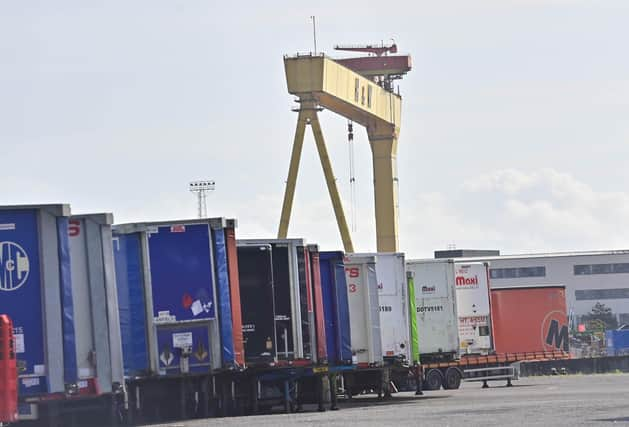Graham Gudgin: Yes, the sea border is an outrage but we will have to work with it


Having been substantially altered in the Windsor Framework it is no longer open to further reform under a Tory government.
There is some hope within sections of the DUP that conditions might improve under an incoming Labour administration. If Labour were to cosy up to the EU and align UK product regulations with those emanating from Brussels, it could make it unnecessary for Northern Ireland producers to come under EU direction and at the same time reduce or eliminate the need for a trade border on the Irish Sea.
Advertisement
Hide AdAdvertisement
Hide AdNone of this is guaranteed and it is unlikely that Labour would go as far as taking the hugely divisive step of rejoining the EU’s single market. Without this, there is no real possibility of renegotiating the Windsor Framework. This horse has already bolted. The EU is not up for continuous renegotiation and if the UK were to take unilateral action, then part or all of the existing free trade agreement that the UK has with the EU would be in danger.


The nightmare scenario for the UK would be an imposition of EU tariffs that endanger key parts of the UK economy such as the large Nissan car plant in Sunderland.
What unionists are likely to have to accept is some form of words that make it clearer than at present that NI remains part of the UK with free access to GB markets until and unless NI decides to leave the UK.
The UK government is offering two inducements for a DUP return to Stormont. After long negotiations and a raft of paperwork, No.10 is offering new legislation on strengthening NI’s position in the UK and in the UK’s internal market. Quite what is meant by this is unclear and we wait to see what will be revealed. It is unlikely, to say the least, that any form of words or proposed legislation will do anything to alter the Windsor Framework. Hence EU regulations will continue to apply to the production of most goods (but not services) within Northern Ireland and restrictions will remain on some goods imported into Northern Ireland from GB. To this extent NI will remain within the EU’s single market.
Advertisement
Hide AdAdvertisement
Hide AdHowever, the UK government could express its desire that NI should remain within the UK and its willingness to use a range of means to pursue this aim. This would reverse the previous anti-unionist rhetoric of the UK “having no selfish strategic interest” in retaining NI within the Union.
In practice nothing much will change, but the political context for unionists would look brighter. The new words will also come with a substantial financial sweetener involving as much as £2.5 billion of extra money for a newly restored Stormont administration to spend. Much of this will fund a pay increase for public sector workers including backpay for those like teachers who have not had a pay increase for years.
Significantly, a new settlement may open the way to a guarantee on future subsidies to Northern Ireland.
A few years ago, the Welsh government obtained a guarantee that its level of public spending per head would be 15% higher than in England. NI is seeking a higher level at over 20%, which would set its funding more securely than under the current Barnett Formula.
Advertisement
Hide AdAdvertisement
Hide AdIf the DUP do not accept this offer, there may be penalties to pay. The House of Commons Northern Ireland Affairs Committee has recently recommended that the cross-community consent veto on operating Stormont should be weakened. Instead of single parties being able to block the assembly, the committee recommends a two-thirds vote for speaker and first and deputy first minister.
Since no single party currently has a blocking third of MLAs, it would take several parties to effect a block in future. A Labour government, advised by former NI permanent secretary Sue Gray, is likely to follow this advice and, if so, Stormont could be revived without DUP agreement.
The DUP has made its point about the damage done by the protocol and has little more to gain by continuing its protest. The remaining issue is whether the protocol in its revised Windsor format puts NI onto a slippery slope towards an economic united Ireland. The available evidence suggests not.
While NI firms have unfettered access to UK and EU markets, unlike the rest of the UK, firms and consumers in NI face customs admin and checks on many goods imported from GB. This will have raised prices in NI and has led some GB suppliers to cease supplying NI.
Advertisement
Hide AdAdvertisement
Hide AdA government survey, originally designed to track business behaviour during Covid, provides good evidence on the withdrawal of mainland firms from the NI market. This Business Insights and Conditions Survey samples a large number of firms every fortnight and asks firms whether they sold anything to NI in the last year. After a few months of the protocol in 2021, the number of firms selling into NI dropped permanently by 16%. For manufacturing firms, the reduction was 25%. As one might expect, most of the withdrawing firms were relatively small. For firms with more than 250 employees there was no obvious reduction. Since these larger firms account for 90% of trade and include the major supermarkets, the reduction in the volume of goods supplied to NI has thus been small and perhaps under 2%. Even so, more people will experience GB firms unwilling to send goods to NI than before Brexit.
There is certainly evidence that firms in NI are buying less from GB. New trade figures published by the NI Statistics and Research Agency just before Christmas show that purchases from GB fell from 30% of all goods bought in NI in 2019 to 25% in 2022.
So, if goods were not being bought from GB where did they come from?
The data shows that the main beneficiary was not the Republic of Ireland where the share of NI sales has been broadly flat at 7%. The beneficiary was instead Northern Ireland itself. Goods bought in NI have increasingly originated within NI, increasing from 51% of all purchases in 2019 to 55% in 2022.
Advertisement
Hide AdAdvertisement
Hide AdWith some confidence that the protocol is not propelling us towards Irish unity, the DUP should regard returning to Stormont as the least-worst option and continue to fight for the Union in the safer surroundings of Stormont.
Dr Graham Gudgin CBE is Associate Researcher at the Centre for Business Research, University of Cambridge